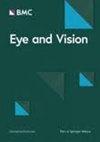小切口皮瓣摘除术中不同角膜盖厚度下的角膜基质下神经丛再支配和基质细胞形态
IF 4
1区 医学
Q1 OPHTHALMOLOGY
引用次数: 0
摘要
角膜帽厚度是设计小切口角膜透镜摘除术(SMILE)的一个重要参数。本研究旨在探讨不同角膜帽厚度下角膜基底层神经丛(SNP)和基质细胞的变化,并评估手术的优化设计。在这项前瞻性、比较性、非随机研究中,54 位接受 SMILE 的患者共 108 只眼睛被分为三组,角膜帽厚度各不相同(110 μm、120 μm 或 130 μm 组)。在术后 1 周、1 个月、3 个月和 6 个月时,收集通过体内角膜共聚焦显微镜(IVCCM)获得的 SNP 和基质细胞形态变化及其屈光结果。采用单因素方差分析(ANOVA)对三组患者的参数进行比较。术后三组的SNP均有所下降,并在6个月的随访中呈现出逐渐上升的趋势。110 μm 组的神经定量指标值明显低于 120 μm 组和 130 μm 组,尤其是在术后 1 周。120 μm 组和 130 μm 组在任何时间点均未发现差异。术后朗格汉斯细胞和角膜细胞都被活化,在随访期间活化情况有所缓解。110微米、120微米或130微米角膜帽厚度设计的SMILE手术对中高度近视矫正具有良好的疗效、安全性、准确性和稳定性,而较厚的角膜帽更有利于角膜神经再生。本文章由计算机程序翻译,如有差异,请以英文原文为准。
Corneal subbasal nerve plexus reinnervation and stromal cell morphology with different cap thicknesses in small incision lenticule extraction
The corneal cap thickness is a vital parameter designed in small incision lenticule extraction (SMILE). The purpose was to investigate the changes in corneal subbasal nerve plexus (SNP) and stromal cells with different cap thicknesses and evaluate the optimized design for the surgery. In this prospective, comparative, non-randomized study, a total of 108 eyes of 54 patients who underwent SMILE were allocated into three groups with different corneal cap thicknesses (110 μm, 120 μm or 130 μm group). The SNP and stromal cell morphological changes obtained from in vivo corneal confocal microscopy (IVCCM) along with their refractive outcomes were collected at 1 week, 1 month, 3 months and 6 months postoperatively. One-way analysis of variance (ANOVA) was used to compare the parameters among the three groups. The SNPs in the three groups all decreased after surgery and revealed a gradual increasing trend during the 6-month follow-up. The values of the quantitative nerve metrics were significantly lower in the 110 μm group than in the 120 μm and 130 μm groups, especially at 1 week postoperatively. No difference was detected between the 120 μm and 130 μm groups at any time point. Both Langerhans cells and keratocytes were activated after surgery, and the activation was alleviated during the follow-up. The SMILE surgeries with 110 μm, 120 μm or 130 μm cap thickness design achieved good efficacy, safety, accuracy and stability for moderate to high myopic correction while the thicker corneal cap was more beneficial for corneal nerve regeneration.
求助全文
通过发布文献求助,成功后即可免费获取论文全文。
去求助
来源期刊

Eye and Vision
OPHTHALMOLOGY-
CiteScore
8.60
自引率
2.40%
发文量
89
审稿时长
15 weeks
期刊介绍:
Eye and Vision is an open access, peer-reviewed journal for ophthalmologists and visual science specialists. It welcomes research articles, reviews, methodologies, commentaries, case reports, perspectives and short reports encompassing all aspects of eye and vision. Topics of interest include but are not limited to: current developments of theoretical, experimental and clinical investigations in ophthalmology, optometry and vision science which focus on novel and high-impact findings on central issues pertaining to biology, pathophysiology and etiology of eye diseases as well as advances in diagnostic techniques, surgical treatment, instrument updates, the latest drug findings, results of clinical trials and research findings. It aims to provide ophthalmologists and visual science specialists with the latest developments in theoretical, experimental and clinical investigations in eye and vision.
 求助内容:
求助内容: 应助结果提醒方式:
应助结果提醒方式:


